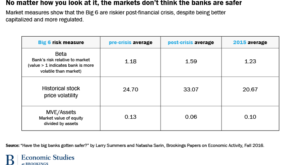VoxEU, October 11, 2016, with Martin Gonzalez-Eiras. HTML. The US fiscal system underwent a radical transformation around the time of the Great Depression. Perceived cost differences of revenue collection across levels of government, due to general equilibrium effects, can partly explain the rise of tax centralization and intergovernmental grants. We develop a micro-founded general equilibrium model that blends politics and macroeconomics. (See the working paper.)
Read More »“Blockchain – Todesurteil oder Wunderwaffe der Notenbanken? (Blockchain – How Does it Affect Central Banks?),” SRF, 2016
SRF, October 8, 2016. Link to MP3. Excerpts from discussion about the role of the blockchain technology for central banking.
Read More »Secular Stagnation Skepticism
I was asked to play devil’s advocate in a debate about “secular stagnation.” Here we go: Alvin Hansen, the “American Keynes” predicted the end of US growth in the late 1930s—just before the economy started to boom because of America’s entry into WWII. Soon, nobody talked about “secular stagnation” any more. 75 years later, Larry Summers has revived the argument. Many academics have reacted skeptically; at the 2015 ASSA meetings, Greg Mankiw predicted that nobody would talk about secular...
Read More »Have Banks Become Less Risky?
In BPEA, Natasha Sarin and Larry Summers argue that bank stock has not: … we find that financial market information provides little support for the view that major institutions are significantly safer than they were before the crisis and some support for the notion that risks have actually increased. … … financial markets may have underestimated risk prior to the crisis … Yet we believe that the main reason for our findings is that regulatory measures that have increased safety have been...
Read More »How Does the Blockchain Transform Central Banking?
The blockchain technology opens up new possibilities for financial market participants. It allows to get rid of middle men and thus, to save cost, speed up clearing and settlement (possibly lowering capital requirements), protect privacy, avoid operational risks and improve the bargaining position of customers. Internet based technologies have rendered it cheap to collect information and to network. This lies at the foundation of business models in the “sharing economy.” It also lets...
Read More »Banking on the Blockchain
In the NZZ, Axel Lehmann offers his views on the prospects of blockchain technologies in banking. Lehmann is Group Chief Operating Officer of UBS Group AG. New possibilities: Higher efficiency; lower cost; more robustness and simpler processes; real-time clearing; no need for intermediaries; information exchange without risk of interference automated “smart contracts;” automated wealth management; more control over transactions; better data protection; improved possibilities for macro...
Read More »Should the Fed Reduce the Size of its Balance Sheet?
On his blog, Ben Bernanke discusses the merits of the Fed’s strategy to slowly reduce the size of its balance sheet to pre crisis levels. Bernanke suggests that this strategy should be reconsidered: First, the large balance sheet provides lots of safe and liquid assets for financial markets. This might strengthen financial stability. (DN: In my view, there are also reasons to expect the opposite.) Second, a larger balance sheet can help improve the workings of the monetary transmission...
Read More »Swiss Sovereign Money Initiative: Reserves For Everyone
On a new website, Aleksander Berentsen rejects the Swiss Vollgeld initiative. As an alternative, he suggests the Swiss National Bank should offer transaction accounts for everybody, in line with proposals I have made earlier (see here (2016), here (2015), here (2015)). In the Handelszeitung (here and here), Simon Schmid reports....
Read More »Reserves For Everyone
On a new website, Aleksander Berentsen rejects the Swiss Vollgeld initiative. As an alternative, he suggests the Swiss National Bank should offer transaction accounts for everybody, in line with proposals I have made earlier (see here (2016), here (2015), here (2015)). In the Handelszeitung (here and here), Simon Schmid reports.
Read More »Economics: The Core
The Economist reviews core ideas in economics. The introductory article points out that economists’ fundamental mission is not to forecast recessions but to explain how the world works. It argues that economists have delivered and it discusses six exemplary areas of economic research: Nash equilibrium; Mundell-Fleming trilemma; Minsky financial-instability; Stopper-Samuelson effect of trade on wages; Keynes fiscal-multiplier; and Akerlof’s and others’ work on information asymmetries....
Read More » Swiss Economicblogs.org
Swiss Economicblogs.org

